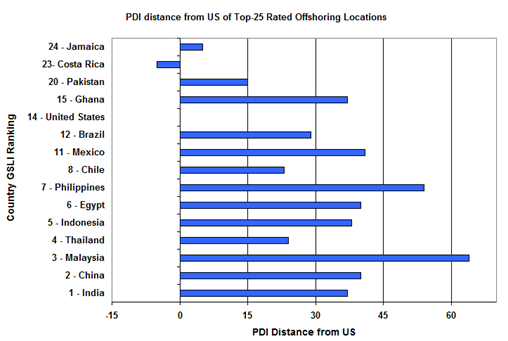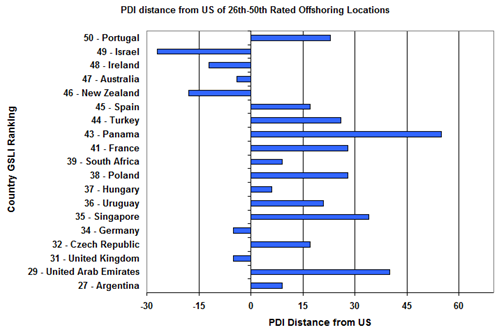One of my most-memorable offshore customer-service experiences involves a Fortune 100 direct-to-consumer computer company. My power cord had stopped delivering power to my laptop, making it a fairly large (and expensive) paperweight. I called the toll free number, ordered a new power cord, validated my shipping address and willingly paid for express delivery.
A few days later, still without a power cord, I called the customer service number and was swiftly routed to an agent in the Philippines. Apparently the power cord had been delivered to my previous mailing address, 1,200 hundred miles away. I explained the urgency of this matter and after a period of absolute and deafening silence, the agent wondered if I could pick it up at my old address. Really? How far do you think 1,200 miles is? Eventually he recovered to cite the company policy for returns and exchanges (not really applicable to the situation at hand) and then swiftly transferred me to a supervisor.
When the concept of ‘Empowerment’ is foreign to a culture, it will be useless to your employees
Such experiences are unfortunately not that unusual from customers who have been served offshore. Some of you might find it surprising that my experience was with an organization who gave their offshore call center agents significant decision-making power in resolving customer problems. So why did I not benefit from the impact of agent empowerment? Because empowerment of entry-level employees is so counter to the culture in the Philippines and other popular offshore locations (namely India) that the initiative fails to address the core customer dissatisfier – that customers are talking to people who more than anything want to please, but are too subjugated to take any definitive action to meet those ends. This is the fundamental reason of why off-shoring of service to these countries has largely failed from a customer experience perspective.
Cultural gaps negatively affect customer experiences
Despite the abundance of both quantitative and anecdotal data about the negative aspects of offshore customer service, with foreign labor costs of 1/5 to 1/10 of U.S. costs, offshoring continues to be a popular initiative. A.T. Kearney’s Global Services Location IndexTM (GSLI)analyzes and ranks the top 50 countries worldwide as the best destinations for providing outsourcing activities, including IT services and support, contact centers and back-office support. The 2009 GSLI report revealed a few key findings:
- India still ranks as the number 1 choice for outsourcing, with the Philippines following in second place.
- Emerging “hot destinations” include the Middle East and Africa (Egypt ranked # 6 in the world; Jordan ranked #9; Ghana ranked #15 and Tunisia ranked # 17)
- Countries in areas capitalizing on (close) proximity to the United States include South America and the Caribbean (Chile ranked # 8 in the world; Cost Rica ranked # 23).
The GSLI Index applies a weighting of 40% to financial attractiveness, and 30% to both People Skills and Availability and to Business Environment. The Business environment category includes an assessment of Cultural exposure [1]. From a Customer Experience perspective, it is this cultural exposure or gap that represents the largest risk to the Customer Experience.
The importance of cultural exposure and fit with the customer base served cannot be underestimated. I am reminded of a story someone told me about the company they worked for. They had an offshore call center handling their customer support. A customer called in regarding a malfunction in her dishwasher. The agents involved were unable to understand why this was such an urgent problem and were unable to provide her a solution. When this situation was brought to the attention of the management team, the agents were called in for a meeting. They defended their response by raising their hands and saying, “If the dishwasher is broken, why not use these? What is the problem?” They just didn’t get it.
HofStede’s five cultural dimensions provide insight into the key ways in which cultures differ. Perhaps the best known of these cultural dimensions is the Power Distance Index (PDI) [2]. The PDI describes the degree to which the less powerful members of a culture expect and accept that power is unevenly distributed. This index essentially speaks to how much a culture values and respects authority. In the workplace, an employee from a culture with a high PDI would expect detailed instructions from supervisors, would never question authority and would actively avoid decision-making. In contrast, an employee from a culture with a low PDI would feel more comfortable challenging or critiquing those in power.
The world average PDI is 55. The United States has a PDI of 40, a relatively low Index. This low PDI indicates that while there is a fair degree of power inequality in our culture, we apply less deference to title, class and status than many other countries in the world. In comparison India and the Philippines have PDIs of 77 and 94, respectively. This explains the high degree of frustration American consumers experience when they seek out-of-the-box problem-solving skills from call center agents in the Philippines or India.
Understanding that cultural differences are the source of offshore customer experience discontent, let us examine what a service experience with an agent in the “hot and upcoming” Middle East and Africa or near-shore options of South America and the Caribbean might look like.
South American and Caribbean countries in the top 25 list (GSLI-ranked) include Jamaica (#24), Costa Rica (#23), Brazil (#12), Mexico (#11) and Chile (#8). With the exception of Jamaica and Costa Rica, the remaining countries all posses Power Distance Indices more than 20 points different than that of the United States, representing a significant difference in culture. While Jamaica and Costa Rica may represent the best options for the United States’ future off-shoring needs (Global Services Location Index within top 25; PDI distance from the US of only 5 units / points), the effects of significant differences between these countries’ and the United States’ Individualism and Uncertainty Avoidance Indices must be considered.
Within the top 25-ranked countries (GSLI-ranked), only one African country (Ghana) made the list. Ghana’s PDI of 77 (distance of 37 units from that of the United States) makes it a cultural mis-fit.
So you are probably asking yourself, just as I did, why have so many chosen to outsource call centers to India and the Philippines? One may assume it’s related to numerous reasons from economic incentives to communications infrastructure to the number of English speaking residents to the large percentage of college graduates. It does seem largely evident that the GSLI was not part of the consideration.
~ Carmit DiAndrea, Vice President of Analytics & Client Services
References
1. The Shifting Geography of Offshoring – The 2009 A.T. Kearney Blobal Services Location IndexTM http://www.atkearney.com/index.php/Publications/global-services-location-index-gsli-2009-report.html





